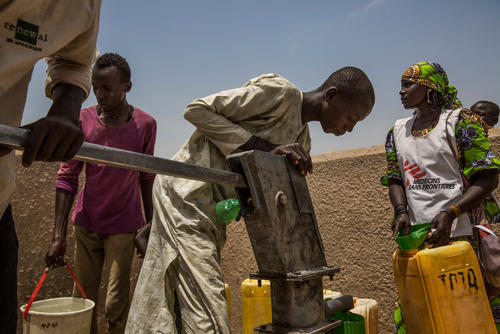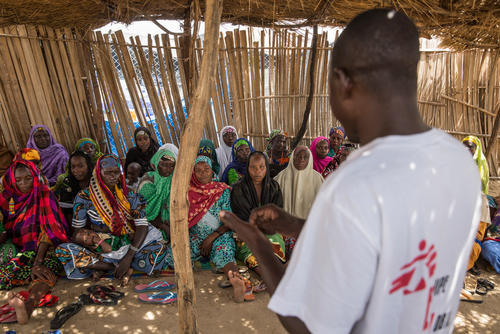The spread of hepatitis E in Niger’s Diffa region has slowed since MSF began detecting and treating cases in early 2017, and the subsequent declaration of the outbreak by the Ministry of Health in mid-April 2017.
The disease, which shares symptoms with other more common illnesses, doesn’t usually have serious consequences, but in pregnant women has a significantly higher fatality rate.
Through a combination of active case finding, quicker diagnosis, a medical protocol, and working with the community through a network of volunteers, the case fatality rate has fallen.

“At the beginning we saw many cases and many deaths”
Dr Roamba, an MSF obstetrician and gynaecologist, is treating patients with hepatitis E at the main mother and child health centre in Diffa, southeastern Niger. In mid-April, the Ministry of Health declared an outbreak of the disease. “At the beginning we saw many cases, and many deaths,” says Dr Roamba.
MSF doctors first began to suspect that they were treating an unusual illness when people, mostly pregnant women, began to arrive at the hospital in early 2017 in a severe and often comatose state. Many did not survive.
The waterborne disease, which affects the liver and can be fatal if not treated promptly, has never before been diagnosed in Diffa. But conflict in the region has led to more than 247,000 displaced people sheltering in sites along the border between Niger and Nigeria, where overcrowded and unsanitary conditions in the sites provide an ideal environment for the spread of diseases like hepatitis E. The disease has now killed more than 40 people in the region.
Since the outbreak was declared, MSF and Ministry of Health staff have supported the treatment of nearly 1,400 people for hepatitis E in our health centres, health posts, and in villages and clinics. We have also treated more than 350 of the most severe cases at the MSF-supported mother and child health centre. Since the beginning of the response by all humanitarian organisations and the Ministry of Health, the case fatality rate has fallen from 29 per cent on 25 April to less than two per cent on 12 October, according to OCHA.
Community approach has reduced the number of deaths
Dr Roamba says that working with the community through a network of volunteers and the water and sanitation response by humanitarian organisations has been critical in decreasing the morbidity of hepatitis E.

MSF’s community approach has seen health and sanitation staff training volunteers to help people spot the disease’s symptoms, keep houses and public spaces clean, and ensure that the water they drink is clean. Communities now quickly bring people displaying symptoms of hepatitis E to health centres and clinics, from where the patients with medical complications are transferred to the mother and child health centre in Diffa. As a result, the number of severe cases arriving at the hospital has plummeted.
“Since we identified the cause as hepatitis E, there has been a big change,” says Dr Roamba. “There are far fewer patients who die, because they arrive here in a better condition [than before].”
The presence of hepatitis E in the Diffa region underscores the precarious living conditions that refugees and displaced people are facing, and the urgent need for humanitarian assistance by those affected by the conflict. Many people have been displaced more than once, fleeing fighting only to have to run again as the battle lines shift. Such a volatile security context creates a challenging environment for humanitarian organisations, and raises the spectre of further deadly outbreaks occurring in communities far from medical care.
MSF has been working in the Diffa region since late-2014 to help people fleeing violence related to Boko Haram and the armies of the region. MSF teams provide free medical and psychological care in 11 health centres and posts in the Diffa region, as well as supplying clean drinking water, constructing latrines and distributing essential relief items in villages and other locations where refugees, returnees and displaced people have gathered. MSF also provides support to the Ministry of Health-run Nguigmi hospital, the main mother and child health centre in Diffa town and Maine Soroa hospital, providing among others reproductive and paediatric care and mental health support. At Nguigmi hospital, the MSF team also provides treatment for children with severe acute malnutrition.


